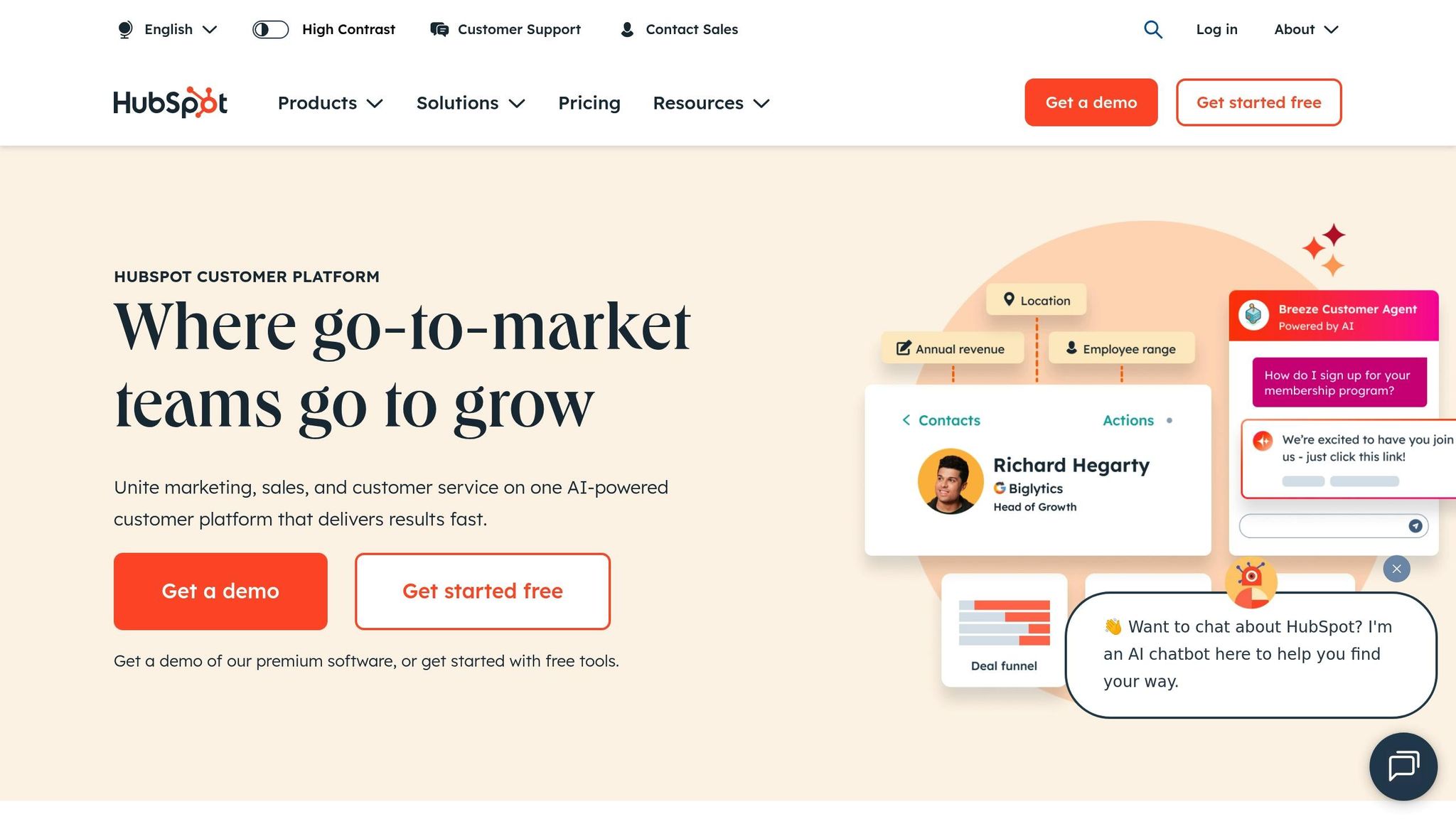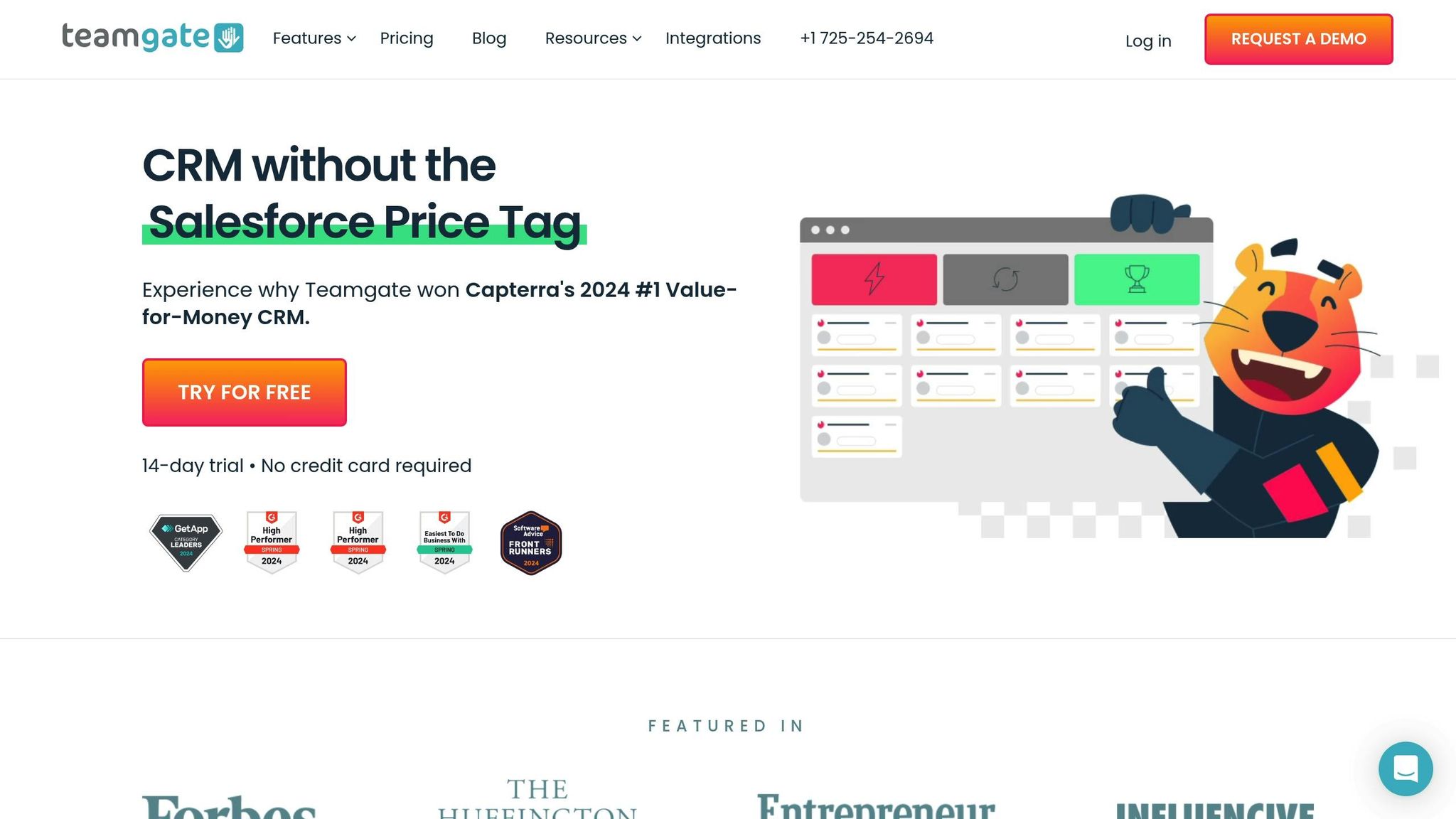Economic uncertainty creates challenges for businesses by tightening budgets, extending sales cycles, and increasing competition. To maintain revenue, companies need flexible sales approaches and tools to address these shifts.
Key takeaways:
- Challenges during uncertainty: Lower customer spending, price sensitivity, longer decision timelines, and cash flow issues.
- Solutions: Use CRM tools like Teamgate to streamline processes, automate tasks, and access real-time data for better decision-making.
- Sales strategies: Focus on customer relationships, offer flexible pricing options, and demonstrate clear ROI to address buyer concerns.
- Team readiness: Train sales reps to handle complex situations, prioritize high-value leads, and use automation to save time.
The right tools and a focus on customer needs can help businesses not just survive but improve their position in the market.
How Economic Uncertainty Affects Sales Performance
What Is Economic Uncertainty
Economic uncertainty arises when businesses and consumers struggle to predict future economic conditions with confidence. This uncertainty can be triggered by various factors, including market volatility, inflation fluctuations, political changes, and global events that disrupt usual business activities.
In the U.S., several indicators signal economic uncertainty. For instance, changes in interest rates by the Federal Reserve can ripple through industries, affecting everything from consumer loans to corporate expansion plans. Supply chain disruptions might lead to sharp price increases or product shortages. Political events like elections or sudden policy shifts can reshape regulations almost overnight.
The stock market often reflects these uncertainties. Significant volatility in indices like the S&P 500 or Dow Jones points to broader concerns about economic stability. Likewise, fluctuations in currency values against the dollar can create challenges, particularly for companies engaged in international trade.
What makes economic uncertainty especially challenging is its psychological impact. Even when core economic indicators remain steady, the mere perception of instability can lead to drastic changes in consumer and business behavior. This reaction can spark a cycle: cautious spending reduces revenues, which, in turn, deepens the sense of uncertainty.
This mix of unpredictability and behavioral shifts creates a tough environment for U.S. businesses to navigate.
Common Challenges for U.S. Businesses
Economic uncertainty brings a host of challenges that directly influence sales performance, including tighter budgets, longer sales cycles, heightened price sensitivity, and intensified competition.
One of the most immediate effects is reduced customer spending power. When people worry about job stability or rising costs, they delay big purchases and scrutinize every expense.
Sales cycles also tend to stretch out. Decisions that once took weeks may now take months as customers seek additional approvals and conduct more thorough evaluations. This is especially true for B2B companies, where buyers grow more cautious and demand stronger justifications for purchases.
Budget constraints push customers to focus on essential purchases over discretionary ones. Sales teams must work harder to prove their products or services deliver clear, immediate value. Items that seemed appealing in stable times now face intense scrutiny over their necessity.
Price sensitivity becomes another significant hurdle. Customers who previously accepted standard pricing may now negotiate aggressively or look for cheaper alternatives. To keep sales volumes steady, businesses often face pressure to lower prices, which can eat into profit margins.
The decision-making process itself becomes more complicated. Purchases that used to be approved by a single manager may now require input from multiple stakeholders. This adds layers of complexity to the sales process, requiring teams to navigate organizational dynamics more skillfully.
Cash flow issues create challenges on both sides. Customers may delay payments or request longer payment terms, while businesses struggle to maintain their own working capital. This makes closing deals tougher and collecting payments slower.
Lastly, competition heats up as companies vie for a shrinking pool of customer budgets. Businesses that weren’t previously direct competitors may now compete for the same dollars, forcing sales teams to work harder to differentiate their offerings and defend their value.
Recognizing these challenges is the first step toward leveraging data-driven CRM tools to adapt and refine sales strategies effectively.
How to Adapt your Sales Strategy in times of Crisis/David Weinhaus, Partner Sales Enablement,HubSpot

Using CRM Tools to Improve Sales Efficiency
When the economy takes a hit, sales teams need every tool in their arsenal to stay ahead. A solid CRM system can make all the difference by keeping productivity on track and uncovering new opportunities. Instead of juggling spreadsheets or scattered notes, businesses can turn to robust CRM platforms to streamline operations and make smarter, data-driven decisions.
The right CRM tools can automate tedious tasks, deliver instant customer insights, and help teams zero in on high-value opportunities. Let’s dive into how Teamgate CRM can transform sales processes, especially during uncertain economic times.
Improving Sales Processes with Teamgate CRM

Economic volatility demands that every lead is handled with care, and Teamgate CRM is built to ensure no opportunity goes unnoticed. Its lead management system is designed to keep potential customers from slipping through the cracks – critical when every prospect counts.
With customizable pipeline management, sales teams can quickly adapt to shifting market conditions. Teamgate offers flexibility with up to three pipelines under the Team plan ($39.90 per user per month) or unlimited pipelines under the Growth plan ($59.90 per user per month). This allows teams to organize deals by type or market segment with ease.
Workflow automations handle repetitive tasks like follow-ups, data entry, and assigning leads, freeing up sales reps to focus on building relationships and closing deals. For example, leads can be auto-assigned to team members based on location or expertise, ensuring quicker responses and better results.
The SmartDialer integration with Twilio simplifies outbound calls, making it easier to maintain consistent contact with prospects – even when budgets are tight. This feature is especially useful for longer sales cycles that require multiple touchpoints to keep deals moving forward.
Centralizing communication is another strength of Teamgate. Its email integration brings all customer interactions into one place, giving teams a full view of every conversation. This is invaluable during complex sales cycles with multiple decision-makers, where having a complete communication history can make or break a deal.
For businesses working with international clients, the multi-currency support feature is a lifesaver. It helps teams navigate pricing and negotiations when currency fluctuations add another layer of complexity.
Setting Up CRM for Real-Time Data Access
Streamlined processes are just the start – real-time data access takes things to the next level. With Teamgate CRM’s sales dashboards, sales managers can instantly see critical metrics like pipeline values, conversion rates, and team performance. No need for manual reports – these dashboards provide an at-a-glance view to help managers spot trends and adjust strategies on the fly.
The advanced analytics and reporting tools, included in the Growth plan, let teams track key performance indicators that predict future outcomes. Metrics like response times, meeting-to-close ratios, and average deal sizes help identify potential issues before they impact revenue.
Teamgate also integrates seamlessly with other tools through API access and Zapier integration, creating a unified system that pulls in data from marketing, customer service, and finance. This ensures sales teams always have the most up-to-date information at their fingertips.
For on-the-go sales reps, Teamgate’s mobile apps for Android and iOS make it easy to update records and access critical data anytime, anywhere. Staying connected has never been simpler.
To help prioritize efforts, the lead scoring feature automatically ranks prospects based on their likelihood to convert. When resources are stretched thin, this ensures sales reps focus on the most promising opportunities first.
The contact management system keeps track of every customer interaction, preference, and purchase history. This comprehensive view allows teams to personalize their approach and show customers the value they’re looking for – especially important when buyers are more selective about their spending.
Finally, configuring the CRM to capture essential data like budget constraints, decision timelines, and competitive pressures ensures that teams are always prepared to address customer needs effectively. Teamgate CRM equips sales teams with the tools they need to thrive, even in challenging times.
Making Data-Based Changes to Sales Methods
When economic uncertainty looms, relying on instincts or outdated sales methods just won’t cut it. Rapidly changing market conditions demand a different approach – one rooted in data. By leaning on hard numbers, businesses can adapt their strategies, fine-tune their messaging, and allocate resources more effectively. This data-driven mindset enables quick adjustments, ensuring sales teams stay ahead of the curve.
With tools like Teamgate CRM providing real-time insights, businesses can continuously refine their sales methods to align with evolving market dynamics.
Monitoring Market Shifts with CRM Insights
Teamgate CRM provides analytics that help you stay ahead of market changes. By tracking various metrics, it reveals shifts in customer behavior before they become obvious through other channels.
For instance, deal velocity metrics show how long it takes prospects to move through the sales pipeline. If the sales cycle starts to slow down, this could indicate that buyers are becoming more cautious with their spending. Teamgate’s reporting dashboard brings these trends to light immediately, allowing teams to respond proactively.
Conversion rate analysis by lead source is another powerful feature. It identifies which marketing channels are still delivering high-quality prospects. If you notice a decline in conversion rates from certain channels, it might be time to reallocate marketing resources. Teamgate breaks down these rates by source, campaign, and even individual sales reps, offering a clear picture of performance.
Customer interaction patterns also provide valuable insights. Teamgate monitors metrics like email response rates, call connection rates, and meeting acceptance rates across different customer segments. A drop in these interactions – slower email replies or fewer accepted meetings – could signal that clients are tightening budgets or undergoing internal changes.
Pipeline value trends offer a high-level view of your sales health. These trends show whether your pipeline is growing or shrinking and highlight which deal sizes are most affected. For example, during uncertain times, larger deals might decline while smaller, more consistent deals remain steady. This helps sales teams adjust their focus and messaging to match the current climate.
Geographic and industry-specific reporting adds another layer of insight. If one region or industry continues to show strong investment while others slow down, you can redirect your resources accordingly. Plus, Teamgate’s multi-currency support simplifies performance tracking across regions and fluctuating economic conditions.
Updating Sales Forecasts and Target Numbers
In volatile times, traditional annual forecasts often lose their reliability. Teamgate CRM addresses this by offering rolling forecasts that update continuously based on real-time pipeline data and conversion trends. This allows sales managers to set realistic expectations that match the current market landscape.
By incorporating market trends into forecasts, businesses can better align their projections with buyer behavior. Teamgate’s rolling forecasts combine weighted pipeline data with scenario planning, offering flexibility to adjust as conditions shift.
Scenario planning is particularly valuable during uncertain times. Teamgate enables sales managers to create multiple forecast scenarios – optimistic, realistic, and pessimistic – based on varying assumptions about market conditions. This helps leadership make informed decisions about hiring, inventory, and cash flow.
Activity-based forecasting takes it a step further by factoring in sales team interactions. For example, if data shows that more customer meetings lead to higher close rates, a drop in meeting frequency might indicate a need to adjust forecasts. This approach ensures that forecasts reflect not just deal values but also the effectiveness of sales processes.
The lead scoring feature becomes even more critical during economic uncertainty. Teamgate dynamically adjusts lead scores based on recent conversion data, helping sales teams prioritize prospects who are most likely to close. If certain industries or business sizes are underperforming, the scoring algorithm adapts to reflect these changes.
During turbulent periods, monthly forecast reviews can replace quarterly planning cycles. Teamgate’s reporting tools make it easy to compare actual performance against forecasts, helping teams identify and revise faulty assumptions. This faster feedback loop ensures sales strategies remain accurate, even in unpredictable markets.
Lastly, territory and rep-level forecasting pinpoints which parts of the sales team are adapting successfully. While some reps may adjust their approach and maintain strong conversion rates, others might struggle. Teamgate’s performance tracking tools help managers identify areas for targeted coaching and optimize lead distribution to improve overall results.
sbb-itb-5772723
Creating Flexible Sales Strategies That Last
Building sales strategies that stand the test of time requires systems that can adapt to shifting markets and customer needs. Instead of relying on aggressive tactics that may falter during uncertain times, successful businesses focus on fostering genuine relationships and delivering meaningful value. The goal is to create a strategy that thrives in any market condition, ensuring steady growth even when external factors create challenges.
Strengthening Customer Relationships
In times of economic uncertainty, your existing customers are your most valuable asset. They already trust your brand, which makes them more likely to stay loyal even when budgets are tight. Strengthening these relationships can be the difference between stability and struggle.
Rather than focusing on constant product pitches, shift your efforts toward understanding the challenges your customers face. Tools like Teamgate CRM’s contact management features help track detailed conversations, ensuring that your team addresses customer concerns promptly and effectively.
Another powerful approach is account-based relationship mapping. This involves identifying key decision-makers and influencers within your customers’ organizations – not just the primary contact. By building connections across departments and levels, you create a safety net that can help maintain stability during organizational changes or budget cuts. Teamgate’s system keeps a detailed record of these interactions, making it easier to manage these relationships.
Frequent, proactive check-ins are also essential. Instead of limiting interactions to quarterly business reviews, many companies are adopting monthly touchpoints. These regular engagements focus on helping customers get the most out of your solutions, reinforcing their trust in your commitment to their success.
Loyalty programs and retention incentives can play a significant role during challenging times. Discounts aren’t the only way to show appreciation. Offering extended support, additional training, or priority access to new features demonstrates your dedication to their success and strengthens the bond.
Proactive problem-solving is another cornerstone of strong relationships. Sales teams that anticipate potential issues and address them before customers even notice build a level of trust that’s hard to beat. Teamgate’s analytics tools can help monitor usage patterns and engagement levels, allowing your team to identify and resolve concerns early.
Value-Focused Selling and Flexible Pricing
Once relationships are solidified, the next step is aligning your pricing strategy with the value you bring. When budgets are under scrutiny, customers need clear evidence that your solution is worth the investment.
Demonstrating ROI becomes critical. Show customers how your product can save money, improve efficiency, or drive revenue. Sales conversations should focus on measurable outcomes, connecting your solution directly to the results they care about. Teamgate’s deal management features make it easier to track and present these value propositions across different customer segments.
Bundling products can also be a smart move. Customers often prefer comprehensive solutions that address multiple needs rather than juggling separate purchases. Bundled offerings can lead to larger deals while delivering greater overall value.
Flexibility in pricing is another key strategy. Offering extended payment schedules, milestone-based payments, or usage-based pricing models can reduce the perceived risk for customers. These options allow them to invest at a level that fits their current budget while leaving room for future growth. Teamgate’s multi-currency support and deal management tools simplify the process of managing these arrangements.
Pilot programs and trial periods are particularly appealing to cautious customers. These low-risk options give prospects a chance to experience your product’s value firsthand before committing to a larger investment. Once the pilot proves successful, it often leads to a full implementation when economic conditions improve.
Finally, value-based pricing requires a more thoughtful approach than traditional, feature-focused selling. Sales teams need to deeply understand each customer’s business model, industry challenges, and competitive pressures. This insight allows you to position your solution as a strategic investment rather than just another expense, increasing the likelihood of navigating through budget cuts.
Teamgate’s sales insights and analytics help pinpoint which value propositions resonate most with specific customer segments. This allows your team to refine messaging and focus on the benefits that matter most to each prospect, creating a pricing strategy that supports a resilient and adaptable sales approach.
Building Strong Sales Teams
Economic uncertainty can weigh heavily on sales teams, making it more important than ever to provide them with the right tools and skills. Teams that can adapt quickly and focus on what truly matters will always have an edge over those stuck in rigid routines. Success lies in creating an environment where sales reps can respond to shifting customer needs while staying productive and motivated.
Training Teams for Flexibility and Customer Understanding
In uncertain times, sales training needs to move beyond traditional product pitches and embrace a more consultative approach. Sales representatives must transform into trusted advisors who help customers navigate their unique challenges. This requires sharpening listening skills and learning to ask the right questions to uncover genuine business needs.
One essential skill is active listening. Sales reps need to pick up on subtle cues – like hints about budget constraints or shifting priorities – that customers may not directly voice. By mastering this, they can position their solutions more effectively and avoid wasting time on deals that won’t materialize.
Workshops focused on problem-solving can also make a huge difference. These sessions teach reps how to break down complex customer challenges and craft tailored solutions, rather than relying on one-size-fits-all approaches. This consultative mindset not only builds trust but also positions your team as problem solvers rather than mere vendors – an invaluable asset in unpredictable markets.
Cross-industry knowledge is another critical tool. Understanding how different industries handle economic challenges allows sales teams to better relate to their customers. For instance, a rep working with healthcare clients should know the ins and outs of budget cycles and compliance requirements specific to that field.
Role-playing exercises are a great way to prepare for tough sales situations. Scenarios like budget cuts, delayed decisions, or requests for steep discounts can be practiced in advance, giving reps the confidence to handle them with professionalism when they arise.
Don’t overlook the importance of emotional intelligence training. Sales reps who can remain calm, empathetic, and solutions-focused during stressful times create stronger relationships with customers – even when a deal doesn’t close right away.
Finally, regular skills assessments can help pinpoint areas where individual team members need extra support. Some reps might be excellent at building rapport but struggle with financial discussions, while others may shine in presentations but need help with follow-up. Targeted coaching can address these specific gaps far more effectively than generic training programs.
Using Workflow Automations to Support Teams
While training is essential, automating repetitive tasks can dramatically boost team productivity. Administrative work often eats into valuable selling time, but workflow automations – like those available in Teamgate CRM – can help eliminate these time drains and ensure critical tasks don’t fall through the cracks.
For example, automated follow-up sequences, lead scoring, and pipeline management can streamline processes and free up sales reps to focus on building relationships. If a lead downloads a whitepaper, Teamgate can automatically schedule a series of follow-up emails and assign tasks to the appropriate rep, keeping the momentum going without manual effort.
Prioritization is another area where automation shines. Instead of manually sorting through every lead, reps can focus on prospects most likely to convert, thanks to automated scoring systems. This is especially valuable when economic uncertainty limits the pool of qualified leads.
Pipeline management automations help keep deals moving forward by triggering reminders and tasks based on specific actions. For instance, if a deal remains stagnant in one stage for too long, the system can notify both the rep and their manager. When a proposal is sent, it can automatically schedule follow-up activities and adjust the deal’s probability.
Automating data entry is another game-changer. With Teamgate’s email integration and calendar sync, communications and meetings are logged automatically, saving time and ensuring no details are lost – even when juggling multiple priorities.
Managers also benefit from reporting automation, which delivers regular insights without the need for manual data compilation. Weekly pipeline updates, monthly performance summaries, and quarterly forecasts can all be generated and shared automatically, helping teams stay aligned and make quick adjustments when needed.
Task automation ensures no steps are missed as deals progress. For instance, when a deal moves to the proposal stage, the system can automatically create tasks for contract preparation, reference calls, and implementation planning.
Finally, integration automations connect Teamgate with other business systems, reducing duplicate data entry and streamlining workflows. For example, when a deal closes, it can automatically trigger onboarding processes, update inventory systems, or create records for accounting.
To make the most of automation, start by targeting the most time-consuming manual tasks and expand from there. Regularly review workflows to ensure they remain effective as business needs evolve. By automating routine tasks, sales reps can focus their energy on the strategic, human-centered work that drives real results.
Conclusion: Success Through Flexible Sales Strategies
Economic uncertainty doesn’t have to derail your sales efforts. In fact, businesses that adjust quickly and use the right tools to navigate shifting market dynamics often come out stronger. By staying flexible, you can keep revenue steady, build deeper customer connections, and set your business up for growth when the economy rebounds.
Challenging times test every part of the sales process, requiring quick and thoughtful adjustments. Companies that embrace this reality don’t just survive – they uncover new opportunities to grow.
With Teamgate CRM, you gain real-time insights that empower your team to adapt on the fly. Access to up-to-date pipeline data, customer behavior trends, and performance metrics means you can make smarter decisions faster. Plus, with automated workflows handling repetitive tasks, your team can focus on what really matters: driving sales and building relationships.
Detailed CRM reports also give you a clear view of market trends, helping you adjust forecasts and spot opportunities early. This forward-thinking approach ensures you stay prepared and adaptable, even in unpredictable markets.
Sales teams that combine real-time customer feedback with actionable data often outperform competitors in volatile conditions. By pairing this human agility with Teamgate’s automation features – like lead scoring and pipeline management – you create an efficient, responsive sales organization ready to tackle any challenge.
The bottom line? Businesses that treat obstacles as opportunities are the ones that achieve lasting success. By adopting flexible sales strategies and leveraging a powerful CRM, you’re not just riding out the storm – you’re setting the stage for future growth. Invest in adaptability and smart tools today to secure tomorrow’s success.
FAQs
How can businesses use Teamgate CRM to adapt their sales strategies during economic uncertainty?
Businesses can turn to Teamgate CRM to adapt to economic challenges by leveraging its data-focused tools. These tools help pinpoint evolving customer preferences and market shifts, providing valuable insights for strategic adjustments. With real-time sales pipeline tracking, teams can prioritize key leads and swiftly modify their approach to meet changing demands.
The platform’s customizable workflows enhance communication and elevate customer interactions, making sales processes more efficient and results-driven. By improving resource allocation and strengthening team adaptability, companies can sustain growth, even when faced with tough market conditions.
How can sales teams build stronger customer relationships when budgets are tight?
In challenging economic times, when budgets are tight, sales teams have a unique opportunity to deepen their connections with customers by focusing on trust and meaningful, personalized engagement. By positioning themselves as trusted advisors and demonstrating a genuine understanding of their customers’ needs, they can nurture loyalty, even during uncertain periods.
A well-integrated CRM platform can be a game-changer here. It enables sales teams to maintain consistent, personalized communication while keeping track of customer preferences and interactions. Beyond this, offering customized solutions that directly address specific pain points and emphasizing value in every interaction can further solidify these relationships.
When sales teams consistently provide excellent service and show authentic care for their customers’ success, they not only build stronger bonds but also foster resilience in their relationships – proving that even with limited resources, trust and reliability go a long way.
How can real-time data from CRM systems improve sales forecasts and strategies during economic uncertainty?
Real-time data from CRM systems equips sales teams with the ability to react swiftly to shifting market dynamics. By offering up-to-date insights into customer behavior and external trends, it enables businesses to fine-tune sales forecasts and align strategies with current demands more effectively.
With access to real-time information, organizations can make informed decisions, reduce risks such as overestimating or underestimating sales, and keep their strategies agile. This level of responsiveness is key to staying resilient and pushing forward during uncertain economic periods.





